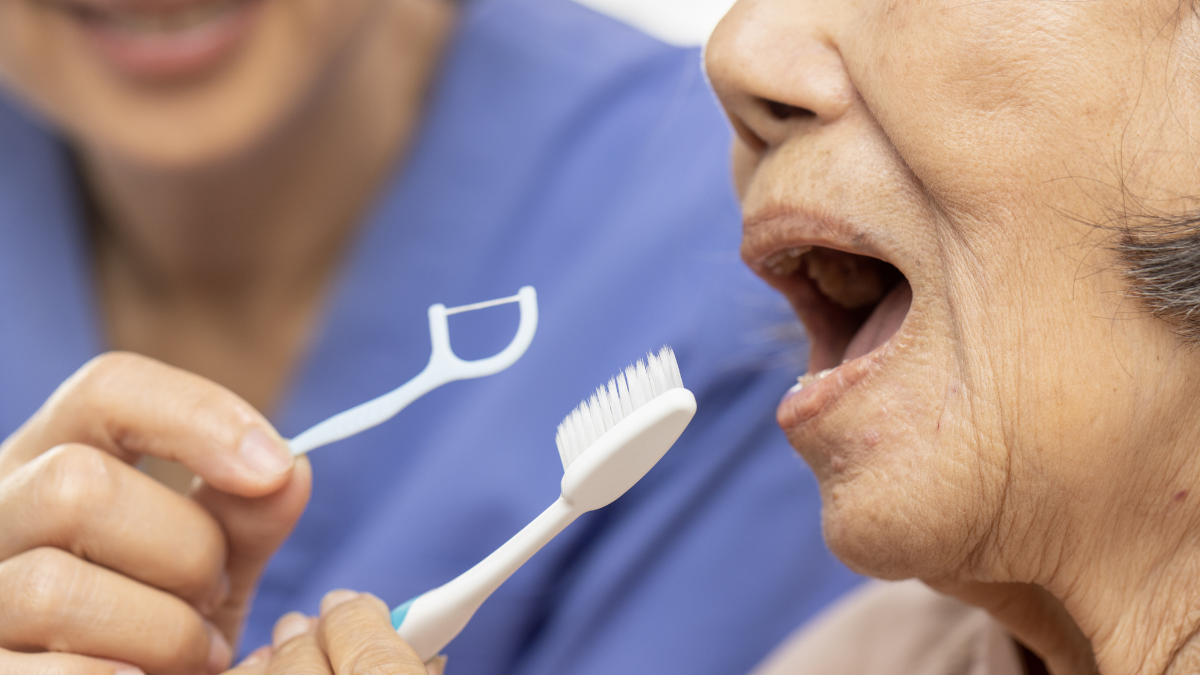
| 10 July 2018
Supporting People With Daily Mouth Care
Expert Guest Blog Post by Jane Peterson RHD BSc, Co Founder of Knowledge Oral Healthcare
We live amongst an aging population1 and as life expectancy increases so does the number of dentate people entering care homes. It is estimated today that less than 6% of the population aged 65 and above are edentulous (have no teeth) compared to 37% in 19682. Inevitably with an aging population, complex medical, cognitive and physical conditions can develop and as these people become less able to care for their own mouth they become more dependent on others to carry out effective mouth care. With this increased level of dependency comes a greater risk of developing poor oral health so it is essential we raise awareness of the importance of daily mouth care.
Oral care is a fundamental aspect to a person’s quality of life. Oral diseases and conditions can be both painful and distressing. They can have an impact on a person’s ability to eat and speak and are increasingly linked to a number of other health problems, many of which can be life threatening such as heart disease and aspiration pneumonia.
Prioritising Oral Care
Professor Leng, deputy chief executive of NICE (National Institute for Health and Care Excellence) declared ‘oral health is too often neglected’ and ‘oral health should be a priority in care homes’3.
In July 2016 the NICE Guidelines (NG48)4; ‘Oral Health for Adults in Care Homes’, were published which includes recommendations on;
- Care home policies on oral health
- Oral health assessments and care plans
- Daily mouth care
- Care staff knowledge and skills
- Availability of local oral health services
- Oral health promotions services.
NICE offers ‘A quick guide for care home managers’6 which includes an Oral Assessment Tool and information on what to expect from the CQC. This is a great starting point for all care homes to begin making the improvements needed for oral health in the elderly and to ensure you are fully ‘CQC ready’.
CQC – Three Quality Statements
The publication of the NICE Quality Standards (QS151)5 in June 2017 sets out 3 quality statements;
- Adults who move into a care home have their mouth care needs assessed on admission
- Adults living in care homes have their mouth care needs recorded in their personal care plan
- Adults living in care homes are supported to clean their teeth twice a day and to carry out daily care for their dentures
NICE offers recommendations to care homes on ‘what works’ and the Quality Standard (QS151) is the rule book to which care homes should refer. Quality standards are designed to drive and measure improvement in quality and can be used to review services. The CQC inspection framework is aligned to NICE quality standards and the introduction of QS151 has recently been incorporated to assess and continually monitor the performance of care homes and identify areas in need of improvement.
Challenges
Providing good oral care for residents can be challenging; time constraints, increased workloads, uncooperative residents and carers lacking knowledge and skills can result in inadequate oral care. In order to safeguard the health and wellbeing of vulnerable elderly people, good daily oral care is crucial. In palliative and end-of-life care it becomes particularly important to ensure the person’s mouth is clean and comfortable. In the words of Professor Leng; “This is about maintaining basic human dignity in those who may need help in looking after themselves”.
Training
There is currently no mandatory oral care training requirement for care homes, which has led carers to be unsure of how to manage simple oral conditions such as bleeding gums, let alone more complex cases. Evidence suggests that nurses have little knowledge of the link between poor oral health, dysphagia and pneumonia, so further mouth care training is recommended.
An Oral Health eLearning course has been developed by Skills for Health, developed for all staff working with patients and residents. The course highlights the importance of oral health including how plaque causes dental disease, why teeth should be brushed, how to care for dentures and the link between oral health and general health.
For further information visit www.kohc.co.uk
- Office for National Statistics 2017
- Adult Dental Health Survey 2009
- https://www.carehome.co.uk/news/article.cfm/id/1577006/Dont-neglect-dental-health-NICE-warns-care-homes
- https://www.nice.org.uk/guidance/ng48
- https://www.nice.org.uk/guidance/qs151
- https://www.nice.org.uk/about/nice-communities/social-care/quick-guides/improving-oral-health-for-adults-in-care-homes
eLearning for healthcare
Unlock your potential – our healthcare eLearning courses make it simple to access high quality content, that deliver on your statutory and mandatory training and compliance needs.
